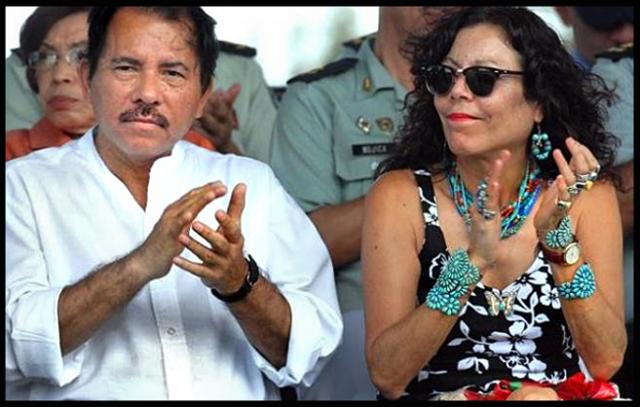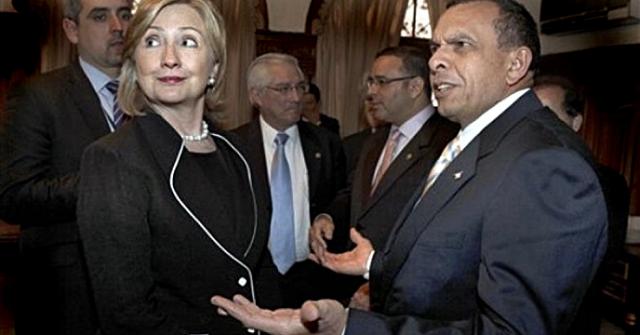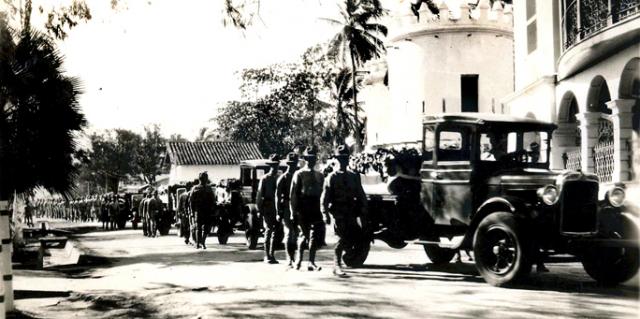The New York Times is the best old-style, broad-sheet newspaper in America; it still covers the world with resourceful and enterprising reporters and commentators. But, then, there’s the other New York Times, the imperial rag that prints editorials like the one on August 5 titled “ ‘Dynasty,’ the Nicaraguan Version.” It’s not that Nicaraguan President Daniel Ortega is a saint or even a model democrat; it’s that the editorial department and the writer who penned this sloppy embarrassment are still playing a version of the Reagan Cold War game of the 1980s. Those days are over; one hopes for something a bit more worldly.
 President Daniel Ortega and his wife Rosario Murillo announcing her vice presidential candidacy
President Daniel Ortega and his wife Rosario Murillo announcing her vice presidential candidacy
After listing a number of negatives — the popular President Ortega has appointed judges favorable to his rule and has been able to assure a legislature filled with his allies — the editorial tells us how well the Nicaraguan economy is doing, how well the Ortega administration works with investors and international business and how safe the place is compared to its three closest neighbors. This safety is, we’re told, due to a sinister “vast police force.” Reading this, one might forget here in the US we have our own “vast” police and criminal justice problems.
Let’s consider for a moment the interesting fact that Nicaragua is notably “safer” than Honduras, El Salvador and Guatemala. First off, during the 1980s under President Ronald Reagan the United States of America directly supported, and in some cases actually directed, cruel and bloody wars against armed guerrillas (and the poor in whose name they fought) in these three small, poor nations. It was the Cold War, so these wars were couched in East-West (communist-capitalist) terms, when they arguably were more accurately described as North-South struggles: ie. they were about powerlessness versus power, poverty versus wealth.
In the case of Nicaragua, the US Contra War was a proxy war against a sovereign nation. In 1979, the Sandinista rebels had overthrown a dictatorship run by Anastasio Somoza, junior, whose father Anastasio, senior, had been a US ally. Franklin Roosevelt famously said of Somoza, senior, “Somoza’s a son-of-a-bitch, but he’s our son-of-a-bitch.” In 1956, the father was shot dead eating dinner in a Leon restaurant by a patriotic poet working as a busboy. (Many Nicaraguans aspire to be poets.) Anastasio, junior, took over the family business and ruled as a US ally until 1979, when he fled to Paraguay, where in 1980 his Mercedes was blown apart by an RPG as the climax of a seven-member Sandinista plot called “Operation Reptile.” His unidentifiable remains were buried in Miami following a big funeral of fellow tyrants and right-wing fat cats.
In the 1980s Nicaragua was a very different animal than Honduras, El Salvador and Guatemala. Nicaraguans had thrown out the bloody, repressive forces that kept the poor and the disenfranchised living in fear. When we’re talking about the Sandinista Revolution and the government that came out of it we’re not talking about perfection. We’re talking about improvements that benefited the poor at the bottom of the pile. We’re talking about aspirations for a mixed economy. The Sandinista government that had been duly recognized internationally as a sovereign government faced a very difficult struggle. Not only did it have to govern, it had to defend itself from an attack by the greatest military and financial power in the world. This attack was meant to either overthrow the Sandinista government outright or cause such destruction and agony that it would establish “the power of a bad example.” In other words, all you other little scruffy nations down there, look to Nicaragua: This could happen to you. So keep your nose clean.
The point is, today, for one reason or another, murder and violence is rampant in Honduras, El Salvador and Guatemala — but it is not so bad in Nicaragua. Could it have something to do with the fact post-Sandinista revolution Nicaragua actually considers its poor as citizens deserving of rights — not as a burden to be exploited or put down?
 President Reagan, his beloved Contras and the Times building in New York
President Reagan, his beloved Contras and the Times building in New York
In its editorial, the Times makes some egregious distortions of the facts. The most egregious one has to do with elections. The Times points out correctly that the 1984 election of Ortega as president, undertaken during the Contra War, was “the nation’s first credible vote.” While Reagan called it “a Soviet-style sham,” it was declared “free and fair” by all international observers. Then the Times plays with the facts and says, “[Ortega’s] bid for re-election in 1990 failed, in large part because of allegations of corruption.”
That was certainly the line of his winning opponent Violeta Chamorro. She was the widow of a famous newspaper publisher assassinated by dictator Somoza in 1978, an act that helped set off the imminent revolution. By 1990, Senora Chamorro was also the mother of adult children on both sides of the Contra War; she reportedly had a rule at family dinners: No politics! She ran as a unifying figurehead in a tiny nation whose population was exhausted by the destruction and killing in the Contra War. It wasn’t “allegations of corruption” at all. It was war weariness that did in Ortega and the Sandinistas. In other words, Ronald Reagan’s Contra War did exactly what it was supposed to do: It made life so difficult for Nicaraguans they cried, “Uncle!”
To fill out the history, Chamorro ruled until 1996. Arnoldo Aleman won the next election and ruled until 2001; he was succeeded by his vice president, Enrique Bolaños. Ex-President Aleman was convicted in 2003 of embezzlement, money laundering and corruption and sentenced to 20 years in prison. In 2006, Ortega was again elected president.
The Times gets away with bad journalism like this because the popular North American image of Central America is — and has been traditionally — of a bunch of little, insignificant dirt-poor nations easily ignored. In this spirit, some conquistador in the 16th century named Honduras with the Spanish word for depths or ditch or ravine. That has always seemed to me akin to the American colloquialism for unpleasant places, “asshole of the world.”
The Times editorial notably does not recognize the American “version” of dynasty now being played out in the carnival of this election season, the Clinton Dynasty. The editorial alludes to something fishy about Ortega’s wife, Rosario Murillo, being named the vice presidential candidate in the upcoming November elections. Murillo is an internationally recognized poet and author; she speaks four languages and does a popular daily radio show. In the 1970s, she was an assistant to La Prensa editor Pedro Joaquin Chamorro assassinated by dictator Somoza. Given Ms. Clinton’s role vis-à-vis her husband and given the Kirchners in Argentina, is such a woman as vice president a sign of corruption or a sign of the times?
The Times editorial’s hypocrisy and its inadequate representation of history blunts any legitimate criticism the editorial may raise. The charge that President Ortega has lined up his ducks un-democratically for his November re-election campaign is hard to take seriously when, here in the mecca of fair democracy, we witnessed the dynastic Clinton machine and its mainstream media stooges like Chris Matthews run over the Bernie Sanders insurgency with the equivalent of tanks. Power tends to protect and promote itself everywhere.
 Secretary Clinton and post-coup President Porfirio Lobo in Guatemala eight months after the coup
Secretary Clinton and post-coup President Porfirio Lobo in Guatemala eight months after the coup
Finally, there’s Secretary of State Hillary Clinton’s after-the-fact full acceptance of the 2009 military coup that overthrew duly-elected, left-leaning President Manuel Zelaya in Honduras. Benghazi was a debacle; this was a cynical decision that harked back to the past and supported wealthy, oppressive elements in Honduras. The coup was followed by a huge rise in murder and violence aimed at the poor and the left, including the assassination of well known environmental activist Berta Caceres and others. This is infuriating for those of us aware of, or tangentially involved in, the politics of Central American in the 1980s.
The Times editorial’s final sentence amounts to a classic imperial threat. Remember, before the Contras, in the 1920s and 1930s it was the US Marines. Here’s their threat: “The course of Mr. Ortega’s own political history should serve as reminder that overthrowing a government can be the citizens’ response when all other avenues for dissent are shut.” Beware! With a little help from friends in Washington and Miami, the ghost of Ronald Reagan could rise like a shining city on a hill. Again, raising the hypocrisy factor, more and more frustrated elements feel we’re arriving at an analogous quandary of shrinking avenues for effective dissent here against out-of-control militarism in the cacophonous, first-world culture of the USA.
 US Marines in Nicaragua in 1931
US Marines in Nicaragua in 1931
The fact is Nicaragua does not suffer the kind of violence found in Honduras, El Salvador and Guatemala; and Nicaraguans are not driven to flee their country as refugees into the US for protection, as they are from the other three countries we consider our allies. The Times editorial avoided digging into why this is the case as if the question was tantamount to the plague. The state of first-world prejudice being what it is, it’s easy to talk glibly about “corruption” in a place like Nicaragua. It’s harder to talk about it when it involves the candidate for President of the United States your editorial department is bending over backwards to elect. Her most winning characteristic is that her opponent and his family would fit right in with the Somoza clan.
All this said, I plan to hold my nose and vote for Hillary Clinton in November. I also plan to be in the street and do whatever else is necessary from inauguration day onward to keep the woman’s administration honest. Walt Whitman said it best about functioning in this crazy age of rising technology, social media, dishonesty and avalanches of bullshit: “Do I contradict myself? So be it. I’m large. I contain multitudes.” Or there’s F. Scott Fitzgerald: “The test of a first-rate intelligence is the ability to hold two opposed ideas in the mind at the same time, and still retain the ability to function.”
The moral of the story is for the New York Times and anybody else so inclined to quit picking on poor, little Nicaragua and pay more attention to their own messy house.
